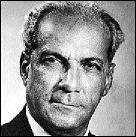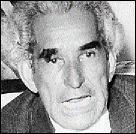Ken Jones, Contributor 
Jones
It can be quite depressing to observe the shallowness of thought so often displayed in debates concerning our political constitution. There are those who see it as a law immutable, which should always be obeyed and never called unwise. Others, like me, tend to re-gard this Constitution as a guide to orderly governance, as perceived by its authors nearly half a century ago. While respect is due to all opinions, it seems ridiculous that anyone should treat each clause as an infallible commandment carved in stone.
Essentially, the Constitution is intended to influence our actions. It should not be seen as an instrument to shackle our thinking; for were such a foolish principle to prevail, there would never be an amendment, change or abolition of what was written by a previous generation to satisfy dreams and visions determined by the mores of a bygone era. This generation and those yet to come would not be worth their salt if they could see no further than the rulers who preceded them and failed to improve upon the legacy bequeathed.
In the generous spirit of the still new year, one might forgive those who up to now have not paused to seriously consider that we have had constitutions before the present one; and that our forefathers had sacrificed life and limb and freedom criticising those conventions in order to enable progressive change in this country.
The gall I find most difficult to swallow is that proffered by stubborn sycophants who seek to denigrate those of us suggesting that the present constitution may not be serving the best interest of the people. Goodness knows that were it not for the critics of constitutions, including Paul Bogle, J.A.G. Smith, Bustamante and Norman Manley, certain analysts, some garbed with cravats, wigs or gowns, might still be wearing overalls and raking muck in the colonial trenches of the Empire. Sad to say, there are at large many mental slaves seeking to persuade others to share the ties that bind them to the past.
History


Manley and Bustamante
For those who care to know about the history of constitutional changes in Jamaica, our present independent constitution did not fall from the sky by divine decree; it has its beginnings in the efforts of J.A.G. Smith, who vigorously excoriated the contents and objectives of the constitution that existed when he was a Member of the Legislative Council. After years of arguing, often against great odds, he declared in 1937, as some of us now complain, "I think the time has come when there must be a change in the political Constitution of the country. We cannot go on this way." And in 1939, after a parliamentary clash with Governor Sir Arthur Richards, he said, "I am serving my country by doing what I think is best and trying to avoid a Constitution which I think is a setback, whatever may be the motive."
H.A.L. Simpson, another stalwart legislator of the period, was among those finding fault with the existing Constitution. He took issue with Major Edward Wood who had been sent from England to hear Jamaicans argue for constitutional change. Wood, no enthusiast for change, had described a Constitution as a delicate plant that had to be safeguarded. To this Simpson replied that the more delicate the plant the more difficult it was to manage or safeguard it from 5,000 miles away. It was this brand of courage that resulted in a Constitution permitting every Jamaican adult to become qualified to vote in 1944. It also led to further constitutional changes in the 1950s when the country won internal self-government.
Encouraging confusion
There are clauses in the 1962 Constitution that tend to be divisive, setting Jamaicans at each other's throats when we should be working peaceably together; encouraging confusion and misunderstandings where there ought to be clarity, commonality and a clearly defined path to progress and prosperity. Perhaps, we should, like another Omar of a different age, "shatter it to bits and then remould it nearer to the heart's desire." This indeed was the motivating force that persuaded Smith to say in 1941: "The Legislative Council is the highest tribunal in the land ... a political constitution should not be forced on a country against the will of the people." Strange that such an enlightened view of democracy should 60 years later be seen as moribund and invalid.
Before J.A.G. Smith there was Paul Bogle and George, William Gordon whose blood was shed as a prelude to the changing of the Jamaica Constitution in 1865. They, too, were regarded as troublemakers in their time. They, too, were seen as iconoclasts by the then defenders of the status quo. They, too, were men who did not obey the Constitution. Later, Alexander Bustamante worked alongside Norman Manley to bring about full Independence Constitution. He emphasised in no uncertain terms how a self-governing administration should operate.
Strong beliefs
The way he dealt with the appointment of important public officials is instructive. He once said, "The Governor General in his own judgment can send back my recommendation. But after it has been sent back, then I would advise him to do as I want. I am the Prime Minister of this country. In the first place it says I should recommend someone, in the second place I advise him. An advice is a command. Even if the Governor General sent that back I would advise the Governor General and send back to instruct him that this is my recommendation and it must go through. I know when to be soft and when to decide my right under the Constitution."
Like it or not, Bustamante, one of the authors of the present Constitution, always insisted that he had the right and duty to appoint to statutory corporations, boards and senior positions, persons in whom he and his government reposed absolute trust. In his view, if such individuals are to occupy posts of strategic importance it was only reasonable that the governing party should have the deciding voice in carrying out its sworn obligations to the electorate.
Another perspective
Incidentally, there is another relevant constitutional interpretation, which was made by Norman Manley. In a statement made when the Jamaican Constitution was being changed to reflect internal self-government, he said, "Adult suffrage has ensured that that every Jamaican is a citizen with equal rights in every aspect of life and dignity. It follows from that that it is essential as we advance to nationhood to see that in the highest political councils only those should be present who have proved their identity with the people by being able and willing to move among them and win their confidence and their votes."
The wisdom and the daring deeds of those heroes shall remain with me even though I do not regard their every act as being flawless and infallible; and I would urge the reader to take a like position. So, when next somebody tries to justify a foolish move by citing constitutional clauses written long ago, do remind them of Major Wood's remark to Jamaicans in 1922: "Those who suffer any mistake under the Constitution are those who live under it." After that, you may decide whether you will live with it or advocate a change.
Ken Jones, a veteran journalist, is general secretary of the Farquharson Institute of Public Affairs.

